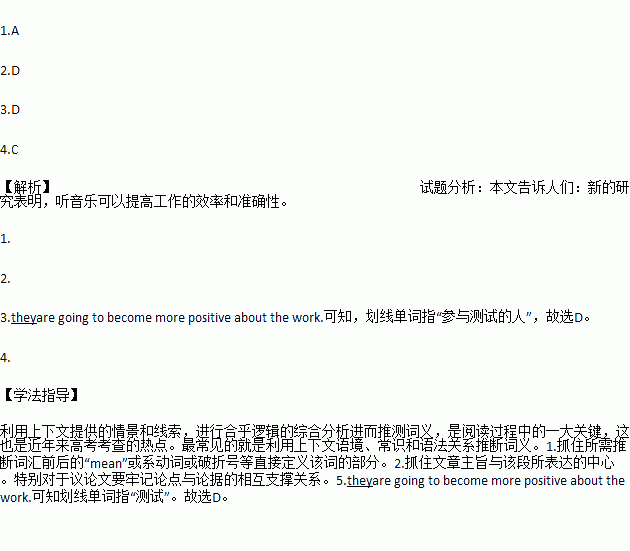题目内容
A new study, conducted by British company Mindlab International, has found that listening to music at work increases accuracy and speed, The Telegraph reported. Perhaps, some parents disagree with this idea, saying, "Switch off the music and concentrate!" Well, if that's the case with your parents, you might now be able to convince them that you have science on your side.
The company gave 26 participants a series of different tasks for five days in a row, including spell checking, mathematical word problems, data entry, and abstract reasoning. The participants completed these tasks while listening to music or no music at all.
The results showed that while music was playing, 88% of participants produced their most accurate test results and 81% completed their fastest work. David Lewis, chairman of Mindlab International, told The Telegraph, "Music is a very powerful management tool if you want to increase not only the efficiency of your workforce but also their emotional state... they are going to become more positive about the work."
However, you may have a list of your favorite songs, but not all kinds of music match all homework. For maths or other subjects involving numbers or attention to detail, you should listen to classical music, the study found. In the study, pop music enabled participants to complete their tasks 58% faster than when listening to no music at all. If you are reviewing your English writing, pop music is the best choice, as it is the best kind for spell checking. It cut mistakes by 14%, compared to listening to no music. After finishing your homework, do you often take time to check your answers? Maybe, some dance music is suitable for you.
1.Which of the following can be the best title for the passage?
A. Music helps us to learn
B. We cannot live without music
C. Different music, different lives
D. Music in the classroom.
2.What did the participants have to do in the study?
A. Persuade their parents to listen to music.
B. Listen to the same music together.
C. Try their best to choose the most suitable music.
D. Finish tasks with music or without music at all.
3.What does the underlined word "they" refer to in Para 3?
A. tools B. results
C. tests D. participants
4.When you review your English writing, what kind of music is the best choice?
A. Classical music B. Dance music
C. Pop music D. Rock music
 提分百分百检测卷系列答案
提分百分百检测卷系列答案
